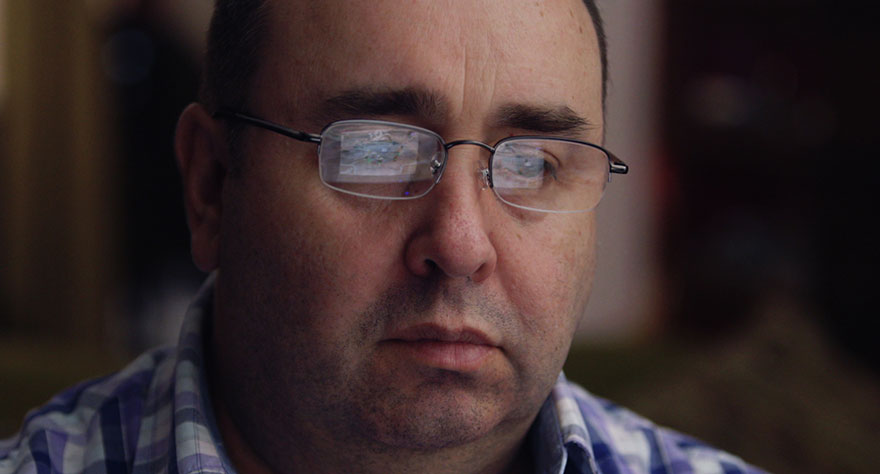
A quietly devastating family drama that perfectly blends form and content.

A quietly devastating family drama that perfectly blends form and content.
Within the first minutes of Kazik Radwanski’s How Heavy This Hammer, it’s apparent that it won’t be a typical character study. It opens with an extreme close-up on Erwin (Erwin van Cotthem), a middle-aged man playing a fantasy video game on his computer. It’s an image that can paint Erwin as an example of the single, lonely gamer, until the voice of his wife Kate (Kate Ashley) can be heard asking him to help with their son Andrew (Andrew Latter), who has locked himself in their car and won’t get out. Yet Radwanski’s camera never lets go of its close distance to Erwin, or anything else in his environment. Almost every shot in How Heavy This Hammer unfolds through handheld close-ups of Erwin, with no establishing or wide shots. It’s a formal choice that isn’t exactly new (handheld cameras can be the bread and butter of low-budget indies sometimes), but it’s Radwanski’s use of this style which makes How Heavy This Hammer feel so distinct. It’s a quietly devastating drama, with a relentless intimacy towards its character that makes its emotional impact all the more powerful.
Most of Erwin’s existence comes across as a desire for him to live the kind of life he should have been living in his 20s. He plays a Viking in a computer game, sits around drinking or eating and plays rugby with a group of guys that are more like acquaintances than friends (it’s also the only socializing he does). He tries to be an attentive father to his sons Andrew and Seth (Seth Kirsh), but he spends most of his days quietly going through the mundane motions of a suburban life. There’s evidence that his lifestyle is taking its toll on him, given his extremely low-level of patience when even the smallest thing gets in the way of doing what he wants. Eventually that feeling extends to his own family, falling asleep when they try to watch a movie together and making it obvious he doesn’t want to do anything with his wife and/or children not involving computer games. When Andrew wakes his dad up after he falls asleep during movie night, Erwin snaps, berating his family for bothering him (“This is fucking ridiculous!” he screams over and over). Then, in one of the film’s many jarring elliptical cuts, Erwin’s moving into a shoddy apartment above a bar.
The close proximity to Erwin and (sometimes) those around him can make it difficult to watch this family’s slow dissolution unfold. Every moment is an invasion of personal space, the camera feeling like it’s on a short leash connected to Erwin, so when the strong emotions come out—like Seth crying after Erwin gets too rough teaching him rugby—there’s no chance to look away. The most remarkable thing about this, and largely why How Heavy This Hammer works so well, is how well Radwanski gets naturalistic performances out of his (I’m assuming) largely nonprofessional cast. Van Cotthem is a compelling force as Erwin, with a realism and presence on screen that never makes a single moment with him ring false. The supporting cast, while sometimes looking like they’ve never performed in front of a camera before, still add a naturalism to the film which never makes it feel manufactured, offering the kinds of performances that would never be possible with professional actors. The fact that this all works, especially with the camera looking like it’s inches from people’s faces, is a feat in itself.
Despite the lack of a clear resolution to Erwin’s conflicts in How Heavy This Hammer (it can feel like Radwanski simply dropped in, filmed a bit, and then dropped out just as quickly), the film remains a fascinating study of a character trying to break free of his own cycles of stagnation. It can feel unflinching in its portrayal of the fallout from Erwin’s decisions although Radwanski is smart enough to never pass any judgment on Erwin or his actions. The film does what great character studies should do, leaving things open for interpretation rather than defining a clear-cut path to follow. How did I take How Heavy This Hammer? I found Erwin to be partially selfish in his quest for change, but sympathetic to his attempts to break out of his patterns. Radwanski and cinematographer Nicholay Michaylov’s (who does seriously impressive work here, considering how well the style ties into content) choice to film in close-ups heightens the feelings of being trapped, along with Erwin’s inability to truly break out of his rut. In what seems like a cruel joke, the only time Radwanski offers breathing room through a long shot is actually a trick; it’s a close-up of Erwin’s computer screen, showing the vast landscapes of the world within his computer game. For Erwin, the only freedom he gets is a poorly rendered illusion of one.